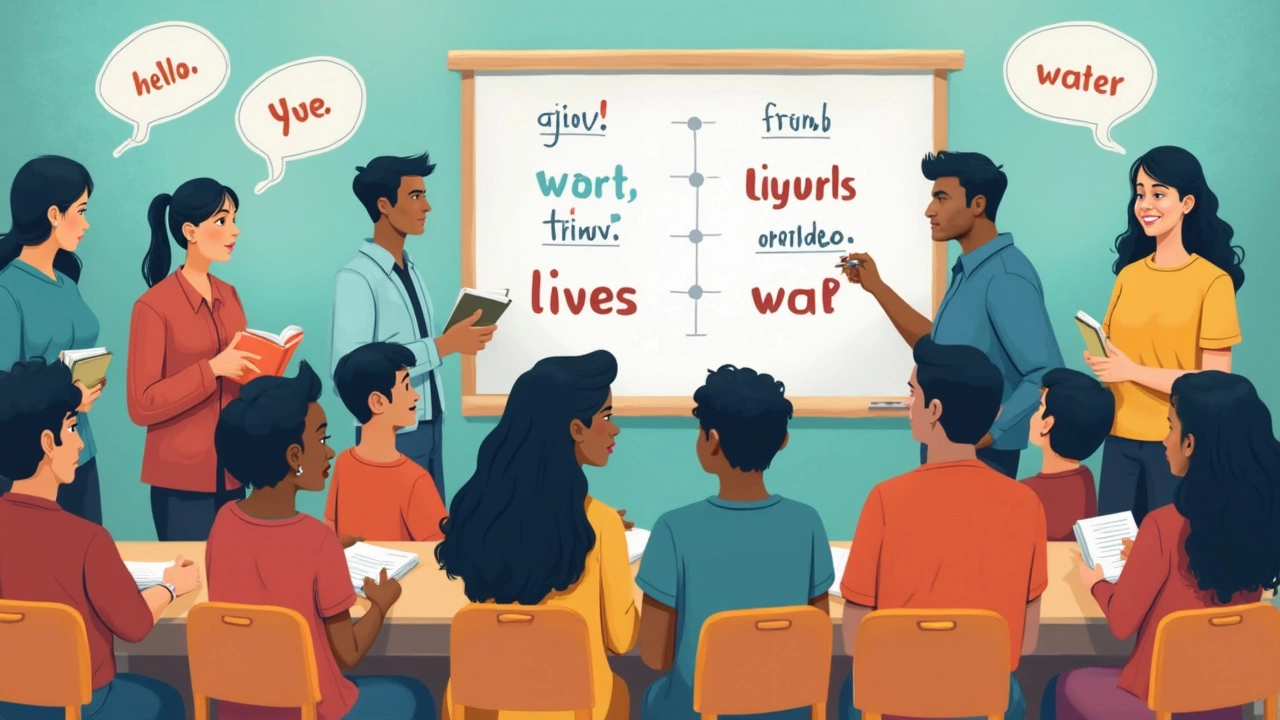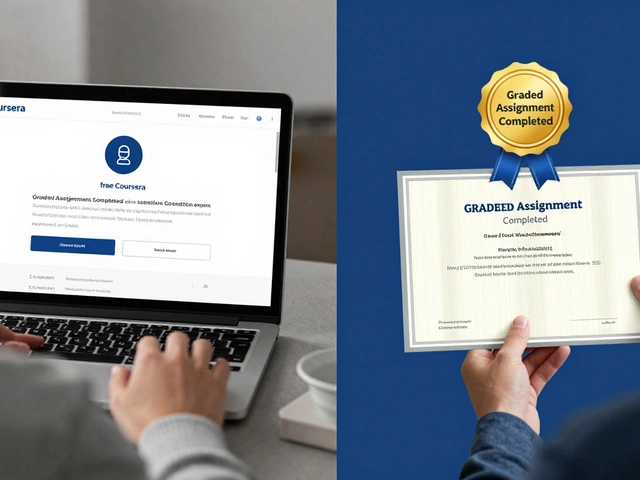Most beginners make the same mistake: they try to learn everything at once and get buried in grammar rules. But here’s the truth—what you really need first is to get comfortable with the basics you’ll actually use in real life. When you walk into your first English speaking course, nobody expects you to recite Shakespeare. You just need the simple building blocks to talk, listen, and connect.
The first thing you should grab onto is practical words and phrases. Think stuff like “How are you?”, “Where is the bathroom?”, or “I need help.” These are sentences you’ll use today, tomorrow, and honestly, every week. Research shows that just 100 of the most common English words make up over 50% of most conversations. That’s a shortcut you shouldn’t skip.
- Why English Basics Matter
- Start With Useful Words and Phrases
- Mastering English Sounds
- Simple Grammar: Don’t Stress Yet
- Listening Skills: Soak Up the Language
- Practice Makes Progress
Why English Basics Matter
Jumping into advanced stuff before you know the basics is like putting fuel in a car that doesn’t have an engine. If you want to join English speaking courses and actually see progress, starting with the basics makes everything easier.
Here’s a fact: According to Oxford, the 25 most common English words make up about a third of all written English. That’s basically a cheat code if you’re just starting out. Focus on those, and you’ll understand and be understood way faster than if you only study rare words or complicated grammar.
The basics are the foundation that support every skill you’ll need—from listening to reading to having a basic chat. Think of learning English like building a house. You wouldn’t put up walls without a solid floor, right?
Most top language teachers back this up. As Steven Krashen, a respected linguist, puts it:
"We acquire language by understanding messages, or by receiving ‘comprehensible input.’ The basics help you get that input without feeling lost."
Plus, simple English is powerful. Companies like Microsoft and Google train their staff to use basic language for clearer messages. This isn’t just for beginners—it’s what professionals rely on for international communication.
Here’s a quick look at how much the basics cover in real language:
| Number of English Words | % of Everyday Conversations |
|---|---|
| 100 | 50% |
| 1,000 | 85% |
| 3,000 | 98% |
So the next time you’re worried about knowing fancy words, remember: the basics aren’t just for kids or total newbies. They’re what everyone relies on to get their point across.
Start With Useful Words and Phrases
If you’re new to English, you shouldn’t waste time trying to memorize fancy words. Stick with everyday stuff that will actually get you talking. Learning beginner English is all about figuring out what’s going to help you order food, ask for directions, or introduce yourself. That’s the real gold.
Most people only use about 1,000 words in their daily life, even natives. But just 100 basic words are the backbone for more than half of what you’ll hear in English speaking courses. You don’t need to learn every word under the sun—target the words you’ll hear and say all the time.
Here are some starter phrases that instantly make things easier:
- “Good morning,” “Good evening,” “Hello” – simple greetings, always useful.
- “Please,” “Thank you,” “Excuse me” – these keep any conversation polite.
- “How are you?”, “What’s your name?”, “Where are you from?” – basics for starting conversations.
- “Can you help me?”, “I don’t understand”, “Could you repeat that?” – handy when you need help.
- “Where is…” or “How do I get to…” – key for finding your way around.
If you focus on these, you’ll be able to handle 90% of beginner situations. Here’s a quick look at the top ten words you’d see the most when starting out:
| Word | Why It Matters |
|---|---|
| I | Talking about yourself |
| you | Talking with others |
| yes | Agreement, answers |
| no | Simple replies |
| what | Questions |
| where | Questions |
| is | Forming questions/sentences |
| the | Everyday language glue |
| this | Pointing things out |
| and | Connecting ideas |
Building up these core words and phrases is your best bet if you want to actually learn English and use it. Repeat them, use them in real life, and don’t be shy about making mistakes. Real progress starts with saying what you need to say, not what’s perfect.
Mastering English Sounds
If you want to be understood in English speaking courses, nailing the sounds of English is a must. You might know what you want to say, but if your pronunciation is off, folks might look at you confused or politely ask you to repeat. English is weird—some letters don’t sound at all the way they look. For example, the "gh" in "enough" sounds like an "f," while in "though," it’s silent. That can throw anybody off.
Start by focusing on the sounds that don’t even exist in your own language. Many learners struggle with the “th” sound (like in "think" and "that"). The only way to get it right is by practicing out loud. Another one is the difference between short and long vowels. "Ship" and "sheep" sound almost the same, but they mean totally different things. Listening to native speakers helps, but recording yourself and playing it back is even better—you’ll catch little mistakes you didn’t notice.
English also has a rhythm and stress pattern that might feel strange at first. Some words are stressed, some are almost swallowed. For beginners, paying attention to stress helps you sound more natural and makes it easier for others to understand you. Here are some practical tips for getting your sounds right:
- Use YouTube or free online pronunciation tools to hear words.
- Break difficult words into syllables and practice each part separately.
- Repeat after native speakers—don’t just read in your head.
- Try tongue twisters. They’re silly but effective. Example: “Three thick thumping thorns.”
- Don’t be afraid to exaggerate sounds at first; it actually helps settle the right habits.
Here’s a quick look at some common trouble spots for beginners:
| Sound | Common Mistake | Tip |
|---|---|---|
| "th" (think, this) | Sounds like "t" or "d" | Bite your tongue gently and blow air |
| Short/long vowels (ship/sheep) | Mix up the length | Listen and mimic pairs |
| Silent letters (knight, honest) | Pronounce every letter | Check the dictionary for silent letters |
Getting these sounds right will make your progress in English way smoother. Don’t expect perfection overnight. Every time you practice, you’ll get a little closer to sounding like a natural speaker.

Simple Grammar: Don’t Stress Yet
If you’re starting an English speaking course, grammar can look like a giant mountain. The secret? You don’t have to climb all at once. In fact, native speakers use simple grammar day-to-day—short sentences, basic verb forms, and one idea at a time.
Skip the complicated stuff for now. Focus on grammar you actually need as a beginner. Here are the essentials:
- The BE verb (am, is, are): Talk about who you are and others. “I am a student.” “He is my friend.”
- Simple Present: For daily things. “I eat breakfast.” “She works here.”
- Personal Pronouns: I, you, he, she, it, we, they. These make every conversation possible.
- Basic Questions: “What is your name?” “Where are you from?” “How old are you?”
- Simple Negatives: Learn “not.” “I am not tired.” “She doesn’t like coffee.”
Want to know the real deal? Research from Cambridge found most daily conversations use just these basics. Almost 70% of spoken English sticks to present tense and simple questions. So, you don’t need fancy grammar to be understood.
| Grammar Form | Everyday Use (%) |
|---|---|
| Simple Present | 45 |
| Simple Past | 15 |
| Other (future, present perfect, etc.) | 40 |
The takeaway? Get comfortable with basic English skills before anything else. If you can form basic sentences and questions, you’ll survive—and even thrive—in so many real-life situations.
Resist the urge to memorize long grammar charts. Just use simple structures over and over. You’ll actually sound more natural, and your brain won’t fry in the process.
Listening Skills: Soak Up the Language
If you want to speak English comfortably, listening is half the battle. When you soak up English through your ears, you start to get a feel for real conversations, slang, and even those weird phrases you won’t see in textbooks. In fact, the British Council points out that "Listening is the most important skill for language learning."
"The more you listen, the more you start to understand patterns, rhythms, and common sounds of the language." — British Council
Let’s be real: you can’t just memorize grammar and hope to understand native speakers. People talk fast. They use shortcuts. You’ll hear words blend together, and sometimes it’s not even clear where one word ends and another begins. Here’s what really helps beginners:
- Watch short YouTube clips of conversations in everyday situations. Kids’ shows and cartoons are gold because they use clear, simple language.
- Listen to real people — podcasts, audiobooks, or even street interviews. Don’t worry if you can’t catch every word. Focus on understanding the main idea.
- Turn on subtitles. Seeing the words while you hear them speeds up your learning big time.
- Try “shadowing.” Listen to a line, then pause and repeat what you hear out loud. It sounds silly, but it’s the fastest way to get your mouth and ears working together.
Here’s a quick fact: Studies at Stanford University found that students who spent 20 minutes a day listening to English improved their understanding almost 40 percent faster than those who only read textbooks. It’s proof that soaking up spoken language isn’t just helpful—it’s necessary.
| Activity | Benefit |
|---|---|
| Listening to podcasts daily | Improves real-life comprehension |
| Watching shows with subtitles | Connects spoken and written words |
| Repeating out loud (shadowing) | Boosts pronunciation and memory |
If you’re in an English speaking course, don’t just nod along when the teacher talks. Actively listen. Try to pick out words, even if you’re not sure what they mean yet. Your brain is like a sponge—the more you take in, the more comes out when you talk.
Practice Makes Progress
If you want to actually improve in English speaking courses, you’ve got to practice—there’s no way around it. Even if you only know a handful of words, using them every day makes a huge difference. Researchers at Cambridge University noticed that students who spoke English for just 10-15 minutes a day outside of class made much faster progress than those who only practiced in lessons.
The trick is to make your practice fun and part of your life. Here are a few ways beginners can really make English stick:
- Read something out loud every day—even street signs or short articles count.
- Watch videos or shows for learners and repeat what you hear, even if you mess up at first.
- Find a speaking buddy, either online or in person, who’s learning too.
- Talk to yourself in English when you’re cooking or walking—sounds weird, but it works.
- Record your voice and listen back. You’ll catch mistakes you never noticed.
Most apps and English speaking courses offer daily challenges—that’s not just for fun. According to Duolingo, their users who practiced four days a week or more improved their speaking confidence much faster than those who barely practiced at all.
You might wonder how much is enough. Start small—aim for at least 10 or 15 minutes a day. The trick isn’t cramming, but showing up regularly. Want proof? Check out this quick comparison:
| Practice Frequency | Average Progress after 1 Month |
|---|---|
| Daily (10-15 min) | Can hold basic conversations |
| 3x Per Week | Knows words, struggles to speak |
| Once Per Week | Little progress |
So, don’t wait for “perfect” English before you start speaking. Progress is all about getting your hands dirty and trying, even when you mess up. That’s how you get real results in any beginner English journey.




